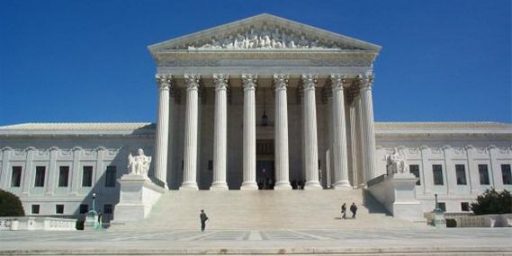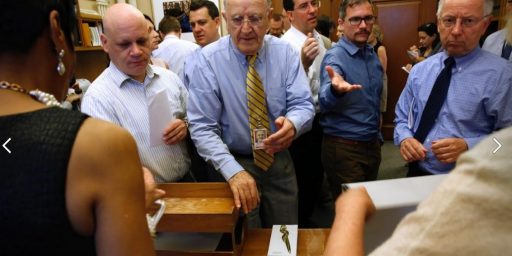Guardians Of “Traditional” Media Once Again Bar SCOTUSBlog From Getting Press Credentials
A committee of journalists who work in the "traditional" media has once again denied press credentials to SCOTUSBlog.
In April, I noted that the Senate Press Gallery, which controls press access to the Supreme Court, had declined to renew the press pass granted to Lyle Denniston, who has covered the Supreme Court for 50 years and serves as the chief “in court” person for SCOTUSBlog, and declined to grant SCOTUSBlog itself its own press pass. The people behind SCOTUSBlog went through the steps to appeal that decision, including a full hearing on the matter that was heard last month. Unfortunately just as we were getting ready for another decision day at the Supreme Court, it was announced that the appeal had been denied:
The popular Supreme Court news site SCOTUSblog has once again been denied credentials to the Supreme Court, publisher Tom Goldstein reported Monday.
“The Standing Committee at the Senate Gallery has apparently denied our credentialing appeal. We do not qualify as journalists,” Goldstein wrote. “We don’t have a copy of their letter. They have (of course) released it to the press, but not to us.”
SCOTUSblog launched in 2002 and, since the Supreme Court’s landmark health care ruling in 2012, has been seen as an invaluable source for news on the Supreme Court. Nearly 10,000 people were on the site on Monday morning in anticipation of the Supreme Court order, according to co-founder Amy Howe.
The site’s reporter, Lyle Denniston, has been denied credentials by the Supreme Court and the Senate. The Standing Committee of Correspondents has arguedthat SCOTUSblog does not meet credential requirements because Goldstein failed to establish a firewall between the blog and his law practice, which argues before the Supreme Court.
The committee posted a copy of the letter it sent to Goldstein on its website and, indeed, it is concerns about the connection between the blog and the law firm that they claim to be their primary concern:
SCOTUSblog failed in three ways to convince the committee that it met this rule:
a) The rule says the publication must be editorially independent of any institution that lobbies the federal government. At the meeting and elsewhere, law-firm partner Thomas C. Goldstein said he controls the editorial direction of the blog and determines areas of coverage. At the same time, Mr. Goldstein advocates before the Supreme Court, which is a form of lobbying the federal government.
Thus, SCOTUSblog fails the test of editorial independence from any institution that lobbies the federal government because it is instead editorially intertwined with a law partner and a firm that lobbies the federal government.
b) The rule says that the publication must be editorially independent of any institution that is not principally a general news organization. That means SCOTUSblog would need to be editorially independent of Mr. Goldstein and the firm, Goldstein & Russell, because neither is principally a general news organization. As stated above, SCOTUSblog is not editorially independent of Mr. Goldstein or Goldstein & Russell.
c) For SCOTUSblog to be editorially independent of Mr. Goldstein and his law firm, it could not, under the rule, serve as a client-generating vehicle for either. But as recently as last year, Mr. Goldstein told the American Bar Association that SCOTUSblog indirectly accounted for 75 percent of the law firm’s Supreme Court business. Mr. Goldstein also uses SCOTUSblog as a platform for publicity material about himself, making the blog part of his personal brand.
At the May 23 meeting, Mr. Goldstein said that SCOTUSblog’s editorial policy of January 2014 is the firewall that keeps the blog editorially independent from the law practice. This policy, posted here and here states that the blog will solicit non-staff reporters to cover cases argued by the firm, and that there will be separate financial accounts for the blog and the firm. Mr. Goldstein said at the meeting that the blog will disclose when the firm has been hired to work on a case covered by the blog in all but the rarest cases.
The committee finds that the SCOTUSblog editorial policy did not go far enough to achieve editorial independence from Mr. Goldstein and his law firm. For a firewall to satisfy the Standing Committee, it would separate the law practice from the publication to prevent the law practice – which is an active advocate before the Supreme Court – from influencing editorial content. Furthermore, at least two people work on both sides of the firewall. Mr. Goldstein, who earns his living at the law firm, controls the blog’s editorial direction and has day-to-day story conversations with SCOTUSblog reporters. The firm manager of Goldstein & Russell also works as the deputy manager of SCOTUSblog. Three of the firm’s four lawyers are listed on the SCOTUSblog masthead. Other contributors to the blog represent clients before the Supreme Court, and the blog covers their cases without noting their relationship to SCOTUSblog. The blog and the firm share office space and resources. Far from keeping the blog editorially independent of the law practice as the rules require, these policies appear to permit the law practice to blend in with the blog. That makes it hard to determine where one ends and the other begins.
For these reasons, we will not reconsider SCOTUSblog’s application at this time.
Goldstein writes about the denied appeal, and what the blog can do going forward, in a post that went up earlier today:
Over the course of the past year, the Committee has seemed to search for a reason for its decision, never explaining its prior decision to grant us a credential. For example, it has questioned whether our sponsorship failed to qualify as advertising. It has also expressed doubts about whether we require on-site access to the Senate.
Today, it settled on the fact that practicing lawyers publish and write for the blog. The Committee takes the view that the blog is not editorially independent from my law firm or from other lawyers who write for the blog. As a consequence, the Committee found, the blog violates two independent requirements under the Committee’s Rules: any credentialed publication must be editorially independent from an organization that (i) “lobbies the federal government”; or (ii) “is not principally a general news organization.”
Put to the side for the moment whether you agree with the Committee’s decision. It should be common ground that its rationale is sweeping and has broad implications for whether non-traditional media is regarded as “journalism.”
Begin with the fact that the decision applies equally to publications in any field, whether health care, automobiles, technology, education, or anything else. It is not dependent on the fact that I work for a law firm that practices before the Supreme Court. The Committee deems it sufficient that the firm is not principally a news organization. So its reasoning extends equally to any publication that is produced by someone who plays dual roles, one of which isn’t a news organization.
As a result, the purpose and effect of the Standing Committee’s decision is to limit credentialing to traditional media in every field. The Rules contemplate that there can be a direct relationship between a publication and non-news organization – they just must be editorially independent. But the Committee construes that requirement of independence in the broadest way possible: to forbid an overlap in personnel.
(…)
It is true that I direct the blog’s coverage. That makes sense because I spend my days and nights thinking about what is going on at the Court. But the Committee deems it irrelevant that there is one major exception to my editorial authority: I cannot direct any of our coverage in any respect regarding any matter in which we play any role.
I think that this is a sad day for what it means to be a journalist, and that the Standing Committee will find itself on the wrong side of history on this question. Is it really the case that even with clear editorial policies in place a school superintendent cannot engage in journalism about education; that a physicist cannot run a recognize publication about physics; and that a blog run by a practicing physician is inherently not “editorially independent”?
As Goldstein goes on to note, it is telling, and perhaps significant, that all of the members of the Standing Committee work in the traditional media at publications ranging from The Wall Street Journal to Roll Call to The Washington Post. As such, it is perhaps not surprising that they end up evaluating SCOTUSBlog through the lens of “traditional” journalism, a standard that the blog admittedly fails to meet. However, if the Internet has taught us anything it is that traditional journalism isn’t the only way to convey information, and indeed that the less traditional methods that the members of this committee obviously aren’t familiar with are better at some things than the so-called traditional media.
SCOTUSBlog is an excellent example of how the new media can be better at something than traditional news outlets. When it was started twelve years ago, it was little more than another law blog that happened to be written by lawyers who practiced almost exclusively before the Supreme Court of the United States. In a very short period of time, however, it quickly became a “go to” site for anyone interested in what was happening at the Court, both because of the analysis of pending and argued cases provided by Denniston, Goldstein, Amy Howe, as well as a vast array of outsider attorneys and law professors who have provided their insights on particular cases after decisions were handed down and because of it became a central resources for every pleading filed in all of the cases being heard by the Court in a given year. Before SCOTUSBlog, those materials weren’t easily accessible and they can be valuable not only to people trying to understand the issues in a particular case but also attorneys dealing with cases that raise similar issues. The fact that this information is provided at no charge to users makes it even more valuable.
Most recently, of course, the blog has become the “go to” site during those times when the Court is in the news. Today, for example, their Live Blog of the Court’s session in which three decisions in cases that weren’t exactly high profile reached some 10,000 users. With only seven cases left, and most of them being cases like Hobby Lobby, the recess appointments case, and the cases dealing with police searches of smartphones, there will probably more users online on Wednesday and Thursday for what could be the final decision days of the Court’s current term. As has been the case the last two years, we’ll likely see anchors on CNN and MSNBC watching that Live Blog as they wait to report on what the Court has decided. Before the Internet, and before Goldstein and those working with him came up with the idea of starting a blog devoted to the Supreme Court, none of this was possible and, even since then, no major media outlet has even attempted to replicate what SCOTUSBlog does. It no small part, that’s because they don’t have the kind of knowledge of the Court that the people who operate the blog do.
As I noted in my April post, the concerns that the Committee raises about the relationship between the blog and the law firm are not without merit. However, it seems to me as though Goldstein has gone through extraordinary lengths to make sure that the blog is in fact editorially independent of the law firm. When there are cases before the Court that the firm is involved in as counsel, that fact is noted in essentially every substantive post about the case and, in most cases that I’ve noticed at least, the analysis of the decision or arguments is usually handled by someone not connected to the law firm. Additionally, at the start of this year the blog took additional steps to separate the operation of the blog from the law firm. From the Committee’s response, it seems clear that the only acceptable solution to them would be a complete separation of the blog and the law firm, which would essentially require Goldstein, Howe, and the others involved in the blog to choose between their legal careers and the work they’ve done on SCOTUSBlog. Obviously, it would most likely be the blog that would suffer in such a situation since it would be deprived of the talents of the very people best able to comment on the subject matter that the blog is devoted to.
Goldstein closes his post with this:
We have the very deepest respect for journalism. Guided by Lyle, we have tried to implement every policy possible to ensure that our coverage adheres to its finest traditions. We remain very grateful that other members of the press and their representatives – including the jurors of the Peabody Award, the Society of Professional Journalists Award, and the National Press Club Award, as well as the Reporters Committee for Freedom of the Press – accept that we are engaged in journalism.
We obviously have a different conception from the Committee on what it means to be a journalist and what it means to be independent. At some point, given that the blog has operated for more than a decade, the proof is in the pudding. You can look and decide for yourself whether we are actually engaged in journalism.
The definition of journalism in the modern world is really what all of this boils down to in the end. Most of the objections that the Committee makes regarding the blog even under its revised editorial polices don’t make any sense unless you view it through an “old media v. new media” lens. For example, the fact that Goldstein & Russell gets client referrals from the operation of the blog is a patently silly point to make. Obviously, the reason the law firm gets those referrals is because of the media attention the blog gets, and it gets that attention because of the quality of the work that it performs. Perhaps it’s true that, in the beginning, the blog was seen as a way to generate business for the firm, that was after all the reason that many lawyers started blogging around the same time that SCOTUSBlog was born. Today, though, it’s obvious that the blog’s purpose has gone beyond mere business generation to something else, and that something else is indeed journalism whether the Standing Committee chooses to recognize it or not.
It’s not clear what all of this means for SCOTUSBlog going forward. Denniston’s press pass is valid at least through the expiration of the Court’s current term so it won’t impact the coverage of this month’s decision days. After that, though, things seem to be up in the air. They can appeal the Standing Committee’s decision to Senate Rules Committee, which hopefully would see the wisdom of reversing the decision, but it’s not at all clear how long that process would take, or whether there’s even a realistic possibility that this matter could be resolved by the time the Court reconvenes on October 6, 2014. Perhaps the blog’s press access will be extended while any such appeal is pending, but there’s no guarantee of that. What’s truly frustrating though is that even this far into the Internet Era, the guardians of dead tree journalism still can’t see that the world has changed.
Update: Eugene Volokh has a post responding to the Committee’s arguments point-for-point.
Update #2: Josh Marshall has an excellent piece of his own about the controversy.






How can you not like our rules? The logic goes in such perfect circles!
Has anyone, EVER, complained about actual bias at SCOTUSblog?
This ticks me off to no end. I hope the Rule Committee reverses & bitchslaps. And I don’t even believe in slapping bitches.
Are you saying that journalists from the same organizations that killed the credentials rely on SCOTUSBlog to get information and understand cases, which they then write about in their respective publications? So, they are deliberately decreasing the usefulness and value of a source they themselves rely upon. Interesting for sure.
I wonder if you could challenge the legality of the entire press credentialing set up. It could be argued that allowing a non-government party to control access to the press galleries constitutes an unconstitutional infringement of the excluded journalist’s first amendment right to petition.
I’d feel much better about the decision (or at least be enjoying plenty of relevant schadenfreude) if the committee at least revoked the credentials of any traditional media organizations whose coverage is demonstrably less accurate than SCOTUSBlog (e.g. CNN and Fox News while the NFIB v Sebelius opinions were being read). Somehow, though, I don’t think they’ll go anywhere near anything like that.
Goldstein makes another good point in his rebuttal as well. The Senate Press Gallery has approved credentials to several state-run media organizations (China, Russia, Saudi Arabia among others) which you can be damned well sure aren’t “editorially independent” from their sponsoring governments. So they’re not even applying their own rules consistently.
In a prefect world, the Judiciary would decide that it shouldn’t depend on the Legislative (cost be damned) to determine press credentials. I would love to see the administrative side of the Supreme Court issue an announcement that they were taking over responsibilities for this function, and effective immediately all legacy media involved with the Senate Standing Committee of Correspondents are having their credentials revoked as obviously self-serving protectionists that are too biased to be credentialed.
King Canute comes to mind.
Thank you so much for this comprehensive article on the SCOTUSBlog mess. I am not an attorney, but have followed SCOTUSBlog for 2 years and refer to it constantly when reading Supreme Court decisions. Reading the decisions has become a hobby and when I need help understanding complicated ones, SCOTUSBlog is my go to site, as well as, during its live blogging on Decision Days. It has become so important to me that I would feel a tremendous loss should it disappear.
Among my circle of friends, I’ve become the go to person for cases and this blog has been one of the major reasons. Being 100% disabled doesn’t allow me to have the satisfaction of a career anymore so I spend much of my time doing research for friends who either don’t have the time or the skills to do it themselves. Surprisingly because of this my friends are better informed and much more interested in the cases being heard by SCOTUS.
@RGardner:
Yea I don’t quite understand why the Court’s own press office doesn’t make these decisions.